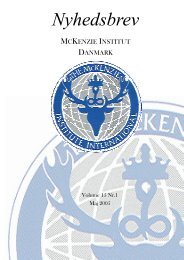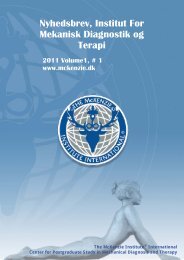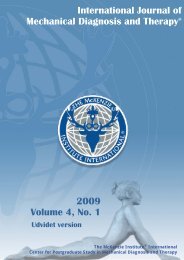Download Vol. 17, nr. 3, December 2005 (PDF-fil, 6,06 ... - McKenzie
Download Vol. 17, nr. 3, December 2005 (PDF-fil, 6,06 ... - McKenzie
Download Vol. 17, nr. 3, December 2005 (PDF-fil, 6,06 ... - McKenzie
You also want an ePaper? Increase the reach of your titles
YUMPU automatically turns print PDFs into web optimized ePapers that Google loves.
<strong>McKenzie</strong><br />
Instituttet<br />
Danmark<br />
Hensigten med dette nummer af<br />
nyhedsbladet var at belyse MDT<br />
og dets potientiale.<br />
Én indgangsvinkel hertil har været<br />
at spørge faculty medlemmer I<br />
<strong>McKenzie</strong> Institut International ad<br />
om deres mening.<br />
I denne omgang kommer her et<br />
bud fra Andrew Holdom, Faculty<br />
UK, Grant Watson Faculty New<br />
Zealand, Uffe Lindstrøm Faculty<br />
Danmark og slutteligt Fra Robin<br />
<strong>McKenzie</strong>.<br />
Red.<br />
Robin <strong>McKenzie</strong><br />
CNZM, OBE, FCSP (Hon),<br />
FNZSP (Hon), Dip MT<br />
What sparked your interest in<br />
mechanical therapy and then<br />
led to such a commitment?<br />
First of all in 1956-7 there was<br />
no such thing as MDT. The<br />
chance event with Mr Smith led<br />
to a sequence of experiments<br />
Faculty perspectives<br />
Faculty perspectives<br />
of trial and error that exposed the<br />
full spectrum of end range movements<br />
and positions that could<br />
lead to centralisation, reduction, or<br />
abolition of symptoms. In the<br />
early 1960’s I read Farfan’s text<br />
called “Mechanical Disorders of<br />
the Low Back” It was after reading<br />
that, that I recognised I was diagnosing<br />
and treating mechanical<br />
disorders of the low back. Hence<br />
Mechanical Diagnosis and Therapy.<br />
The commitment came because<br />
of the frustration that resulted<br />
from the failure by the so<br />
called experts to recognise the<br />
importance of these phenomenon.<br />
Hence my determination to “ram it<br />
down their throats” It would appear<br />
that this is a life long mission.<br />
What do you feel is the biggest<br />
problem(s) students on our<br />
courses have assimilating MDT<br />
principles?<br />
Mainly because the approach is<br />
so completely different from all of<br />
their prior experiences and teachings.<br />
These teachings commonly<br />
require a diagnosis and evaluation<br />
based solely on what the therapist<br />
sees and feels and which<br />
completely ignores what the patient<br />
feels and reports in response<br />
to end range movement<br />
and positional loading.<br />
Physical Therapists traditionally<br />
do something to the patient. Usually<br />
by hands on! The idea that<br />
the patient himself can achieve a<br />
better result without being given<br />
the magic fingers treatment is<br />
anathema. How embarrassing it<br />
must be if you have been manipulating<br />
and mobilising patients for<br />
ten years only to find out that<br />
much, if not most of it is totally<br />
unnecessary. Students will be<br />
convinced if they see it happening.<br />
Hence the need for<br />
large numbers of patients on<br />
courses.<br />
What do you see as the most<br />
challenging aspect of mechanical<br />
therapy’s future?<br />
Without doubt it is the dissemination<br />
of the knowledge of<br />
MDT that is paramount. Publishing<br />
and dissemination. Repeatedly<br />
presenting the evidence<br />
again and again. Ignorance<br />
of our operation and<br />
method is so widespread because<br />
it challenges current<br />
thinking. How many researchers<br />
have ever sat through a<br />
patient evaluation and witnessed<br />
centralisation reduction<br />
or abolition of symptoms?<br />
None that matter, as far as I<br />
am aware.<br />
When you have to explain over<br />
and over, wherever you go,<br />
what centralisation is, what it<br />
means in terms of prognosis,<br />
and what you have to do to<br />
achieve it, you eventually treat<br />
the ignorant with contempt. At<br />
least I do. The original book<br />
was written in 1981 for god’s<br />
sake. How long does it take?<br />
Until the evidence is beyond<br />
doubt we remain unnoticed in<br />
the general sense.<br />
What do you see as the most<br />
promising aspect of mechanical<br />
therapy’s future?<br />
Mounting Evidence. Again<br />
without doubt, the rapid rash of<br />
studies giving a continuous<br />
flow of support must eventually<br />
<strong>Vol</strong>ume <strong>17</strong>. <strong>nr</strong>. 3. <strong>December</strong> <strong>2005</strong> <strong>McKenzie</strong> Institut Danmark, Nyhedsbrev 12





